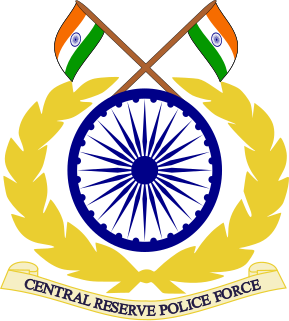
Central Europe is the region comprising the central part of Europe. It is said to occupy continuous territory that are otherwise conventionally Western Europe, Southern Europe, and Eastern Europe. The concept of Central Europe is based on a common historical, social and cultural identity. Central Europe is going through a phase of "strategic awakening", with initiatives such as the CEI, Centrope and the Visegrád Four. While the region's economy shows high disparities with regard to income, all Central European countries are listed by the Human Development Index as very highly developed.

The Central African Republic is a landlocked country in Central Africa. It is bordered by Chad to the north, Sudan to the northeast, South Sudan to the east, the Democratic Republic of the Congo to the south, the Republic of the Congo to the southwest and Cameroon to the west. The CAR covers a land area of about 620,000 square kilometres (240,000 sq mi) and had an estimated population of around 4.6 million as of 2016.

A central bank, reserve bank, or monetary authority is an institution that manages a state's currency, money supply, and interest rates. Central banks also oversee the commercial banking system of their respective countries. In contrast to a commercial bank, a central bank possesses a monopoly on increasing the monetary base in the state, and also generally controls the printing/coining of the national currency, which serves as the state's legal tender. A central bank also acts as a "lender of last resort" to the banking sector during times of financial crisis. Most central banks also have supervisory and regulatory powers to ensure the solvency of member institutions, to prevent bank runs, and to discourage reckless or fraudulent behavior by member banks.

Central America is located on the southern tip of North America, or is sometimes defined as a subcontinent of the Americas, bordered by Mexico to the north, Colombia to the southeast, the Caribbean Sea to the east, and the Pacific Ocean to the west and south. Central America consists of seven countries: Belize, Costa Rica, El Salvador, Guatemala, Honduras, Nicaragua, and Panama. The combined population of Central America has been estimated to be 41,739,000 and 42,688,190.

Central Asia stretches from the Caspian Sea in the west to China in the east and from Afghanistan in the south to Russia in the north. The region consists of the former Soviet republics of Kazakhstan, Kyrgyzstan, Tajikistan, Turkmenistan, and Uzbekistan. It is also colloquially referred to as "the stans" as the countries generally considered to be within the region all have names ending with the Persian suffix "-stan", meaning "land of".

The central nervous system (CNS) is the part of the nervous system consisting of the brain and spinal cord. The central nervous system is so named because it integrates the received information and coordinates and influences the activity of all parts of the bodies of bilaterally symmetric animals—that is, all multicellular animals except sponges and radially symmetric animals such as jellyfish—and it contains the majority of the nervous system. Many consider the retina and the optic nerve, as well as the olfactory nerves and olfactory epithelium as parts of the CNS, synapsing directly on brain tissue without intermediate ganglia. As such, the olfactory epithelium is the only central nervous tissue in direct contact with the environment, which opens up for therapeutic treatments. The CNS is contained within the dorsal body cavity, with the brain housed in the cranial cavity and the spinal cord in the spinal canal. In vertebrates, the brain is protected by the skull, while the spinal cord is protected by the vertebrae. The brain and spinal cord are both enclosed in the meninges. In central nervous systems, the interneuronal space is filled with a large amount of supporting non-nervous cells called neuroglial cells.

Eastern Europe is the eastern part of the European continent. There is no consensus on the precise area it covers, partly because the term has a wide range of geopolitical, geographical, cultural, and socioeconomic connotations. There are "almost as many definitions of Eastern Europe as there are scholars of the region". A related United Nations paper adds that "every assessment of spatial identities is essentially a social and cultural construct".

Central Park is an urban park in Manhattan, New York City. It is located between the Upper West Side and Upper East Side, roughly bounded by Fifth Avenue on the east, Central Park West on the west, Central Park South on the south, and Central Park North on the north. Central Park is the most visited urban park in the United States, with 40 million visitors in 2013, and one of the most filmed locations in the world. In terms of area, Central Park is the fifth-largest park in New York City, covering 843 acres (341 ha).

The University of Central Florida, or UCF, is a state university in Orlando, Florida. It has more students enrolled on campus than any other U.S. college or university.

Comedy Central is an American pay television channel owned by Viacom Global Entertainment Group, a unit of the Viacom Media Networks division of Viacom. The channel is geared for mature audiences and carries comedy programming in the form of both original, licensed, and syndicated series and stand-up comedy specials, as well as feature films.

The Reserve Bank of India (RBI) is India's central banking institution, which controls the issuance and supply of the Indian rupee. Until the Monetary Policy Committee was established in 2016, it also controlled monetary policy in India. It commenced its operations on 1 April 1935 in accordance with the Reserve Bank of India Act, 1934. The original share capital was divided into shares of 100 each fully paid, which were initially owned entirely by private shareholders. Following India's independence on 15 August 1947, the RBI was nationalised on 1 January 1949.

Grand Central Terminal is a commuter rail terminal located at 42nd Street and Park Avenue in Midtown Manhattan, New York City. Grand Central is the southern terminus of the Metro-North Railroad's Harlem, Hudson and New Haven Lines, serving the northern parts of the New York metropolitan area. It also contains a connection to the New York City Subway at Grand Central–42nd Street. The terminal is the third-busiest train station in North America, after Toronto Union Station and New York Penn Station.

The Central Reserve Police Force (CRPF) is the largest of India's Central Armed Police Forces. It functions under the aegis of Ministry of Home Affairs (MHA) of the Government of India. The CRPF's primary role lies in assisting the State/Union Territories in police operations to maintain law and order and counter insurgency. It came into existence as the Crown Representative's Police on 27 July 1939. After Indian Independence, it became the Central Reserve Police Force on enactment of the CRPF Act on 28 December 1949.

The North American Central Time Zone (CT) is a time zone in parts of Canada, the United States, Mexico, Central America, some Caribbean Islands, and part of the Eastern Pacific Ocean.

The Eastern Time Zone (ET) is a time zone encompassing part or all of 22 states in the eastern part of the contiguous United States, parts of eastern Canada, the state of Quintana Roo in Mexico, Panama in Central America, and the Caribbean Islands.

The Mountain Time Zone of North America keeps time by subtracting seven hours from Coordinated Universal Time (UTC) when standard time is in effect, and by subtracting six hours during daylight saving time (UTC−06:00). The clock time in this zone is based on the mean solar time at the 105th meridian west of the Greenwich Observatory. In the United States, the exact specification for the location of time zones and the dividing lines between zones is set forth in the Code of Federal Regulations at 49 CFR 71.

UTC−05:00 is a time offset that subtracts five hours from Coordinated Universal Time (UTC). In North America, it is observed in the Eastern Time Zone during standard time, and in the Central Time Zone during the other eight months. The western Caribbean uses it year round.
PubMed Central (PMC) is a free digital repository that archives publicly accessible full-text scholarly articles that have been published within the biomedical and life sciences journal literature. As one of the major research databases within the suite of resources that have been developed by the National Center for Biotechnology Information (NCBI), PubMed Central is much more than just a document repository. Submissions into PMC undergo an indexing and formatting procedure which results in enhanced metadata, medical ontology, and unique identifiers which all enrich the XML structured data for each article on deposit. Content within PMC can easily be interlinked to many other NCBI databases and accessed via Entrez search and retrieval systems, further enhancing the public's ability to freely discover, read and build upon this portfolio of biomedical knowledge.

Adherents of Islam constitute the world's second largest religious group. According to a study in 2015, Islam has 1.8 billion adherents, making up about 24.1% of the world population. Most Muslims are either of two denominations: Sunni or Shia. Islam is the dominant religion in Central Asia, Indonesia, Middle East, North Africa, the Sahel and some other parts of Asia. The diverse Asia-Pacific region contains the highest number of Muslims in the world, easily surpassing the Middle East and North Africa.




















